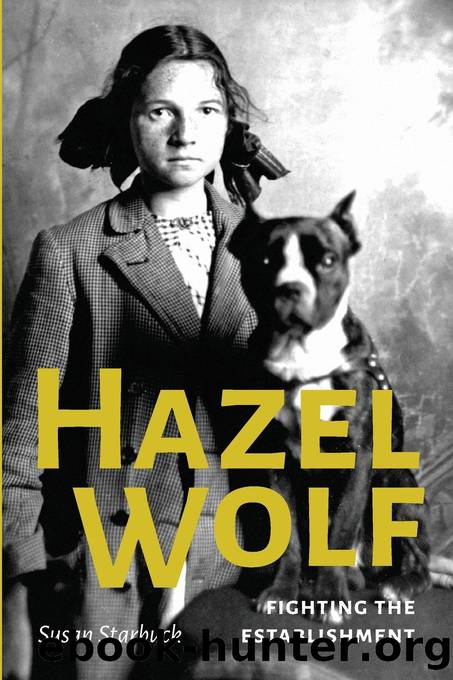Hazel Wolf by Susan Starbuck

Author:Susan Starbuck
Language: eng
Format: epub
Publisher: University of Washington Press
Published: 2015-03-15T00:00:00+00:00
BIRDING BINGE
The day I retired as John Caughlanâs secretary, on February 19, 1965, I had my ski outfit on and I brought my snowshoes to the office. At five oâclock I went straight to the bus depot and out to Ellensburg, where an Audubon friend, Ruth Boyle, and I went out on a trip. I felt like a kid out of school on vacation. For a long time I had been frustrated in Seattle, separated from nature. Joining the Audubon Society started me on a career of getting out of the city, or just going to the parks and looking at birds, which I could afford to do with a bus token. Pretty soon Ruth and I got acquainted with Ruth Anderson, Ruth Cameron, and Gladys Squires, and we found that we all liked trips. Ruth Anderson, Ruth Boyle, and Ruth CameronâI called them Ruths A, B, and C.
I went on a binge with these friends, camping all over the United States, looking at birds, or anything else that came up.6 We avoided all citiesâcovered almost the entire United States. Now, thatâs a lot of trips. Sometimes weâd be gone for six weeks. In those days you didnât go to camping sites. You just stopped at the side of the road or trail, pitched your tent, made dinner, and went to sleep. It was that simple. Now itâs all regulated.
I was always a water person, so I liked to run rivers, tooâthe Grand Canyon of the Colorado, the Rogue, the North Platte, the Grande Ronde River in Oregon, and many others. In 1967, when Ruth Boyle and I arrived at Ely, Minnesota, to begin our trip into the Boundary Waters Canoe Wilderness Area,7 we had just a little pile of gearâraincoats, a change of clothing if we got wet, food. We brought only pitted prunes, and we seriously thought about cutting the handles off our toothbrushes.
âIs that all youâve got?â is what they said when we rented the canoe. They asked, âOnly you two women?â
I said, âDo you think we need more women?â
Then they asked, âDo you know how to paddle?â
They made us go out on the water while they watched to see if we could paddle. They didnât want to let us go into this dangerous wilderness.
All we had was a compass and a map. We camped wherever we found a place, and we portaged eighteen times. Ruth carried the canoe, her shoulder pads on, her head inside it. I led, carrying the gear. The portages had been established in the ice age by animals following the receding glaciers, making paths around waterfalls and rapids. They were followed by the pre-Columbian Indians, who went the same way. They used little stones to make their fireplaces. Later, the traders, the French Canadians carrying their big three-hundred-pound packs, camped in the same places. Then along came Ruth and Hazel. We used the same Indian stones and the same paths that the animals had started for us, worn deep like little trenches.
We didnât see many other people out in the wilderness for ten days and it was just great.
Download
This site does not store any files on its server. We only index and link to content provided by other sites. Please contact the content providers to delete copyright contents if any and email us, we'll remove relevant links or contents immediately.
Down the Drain by Julia Fox(981)
The Light We Carry by Michelle Obama(900)
Cher by Cher(798)
Simple Passion by Annie Ernaux(747)
Love, Pamela by Pamela Anderson(603)
The Nazis Knew My Name by Magda Hellinger & Maya Lee(579)
Zen Under Fire by Marianne Elliott(565)
You're That Bitch by Bretman Rock(551)
Novelist as a Vocation by Haruki Murakami(543)
Alone Together: Sailing Solo to Hawaii and Beyond by Christian Williams(533)
The Foxfire Book of Appalachian Women by Kami Ahrens(531)
Kamala Harris by Chidanand Rajghatta(497)
Gambling Man by Lionel Barber(490)
The Barn by Wright Thompson(440)
Drinking Games by Sarah Levy(430)
A Renaissance of Our Own by Rachel E. Cargle(418)
Limitless by Mallory Weggemann(417)
A new method to evaluate the dose-effect relationship of a TCM formula Gegen Qinlian Decoction: âFocusâ mode of integrated biomarkers by unknow(416)
Memoirs of an Indian Woman by Shudha Mazumdar Geraldine Hancock Forbes(415)
